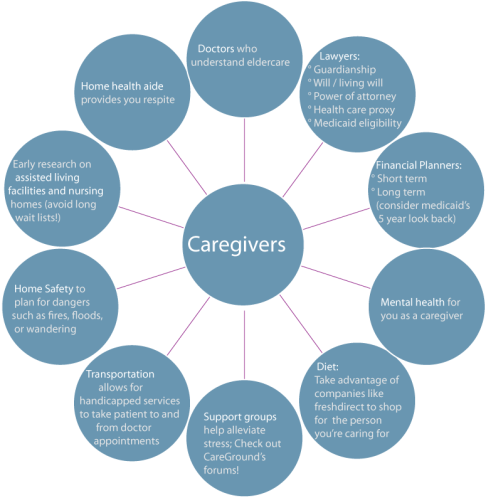As part of the agingcare.com network I want to share this article about POAs written by Lori Johnston.
Squabbles over assigning Power of Attorney – who can act on your parent’s behalf – and the decisions made in that role can impact the family dynamic for years to come.
Even when mom or dad plans ahead and creates the Power of Attorney (POA) legal document before they’re impaired by a health condition, there can be ongoing strife among siblings and family members.
Sometimes the decision of who to appoint in the Power of Attorney role, from the parent’s standpoint, is cut and dry. Parents will put their faith in the oldest child, or choose one child over another based on who lives closest or whom they trust because of their skills, especially with financial decisions.
Diana Anderson, a certified elder law attorney and partner with Carluccio, Leone, Dimon, Doyle & Sacks in Toms River, N.J., says clients have told her: “I’m choosing that one; the other one can’t balance their own checkbook.”
In other cases, a parent is suspicious about their child and doesn’t trust them 100 percent with their money. Sometimes if the oldest isn’t chosen, there’s emotional backlash toward parents and siblings because they are insulted by the decision.
Depending on the state, multiple people can be appointed Power of Attorney, but that can result in arguments later, if they cannot agree on a decision. Or if living in a state where there are different types of Power of Attorney, such as for healthcare and financial decisions, the duties can be separated between siblings.
“When it comes to healthcare decision-making, if the child is a nurse or doctor, that child oftentimes is named first because they’re more attuned to health care issues. If the child is a financial planner, they may be named first for financial decision making,” says Ronald Fatoullah, a certified elder law attorney and founder and managing attorney of Ronald Fatoullah & Associates.
The POA Decision Aftermath
If the appointment of POA is smooth and didn’t involve much gnashing of teeth, that doesn’t mean bickering won’t begin once the person granted POA assumes duties related to parents’ financial and medical decisions. Many times, the challenge to the POA happens after the parent passes away, Anderson says.
While the parent is still alive, a sibling may try to trump the person appointed POA by saying their parent was incapacitated when making the decision. When that happens, it can result in an expensive guardianship fight in court.
Here are other common situations seen by elder care attorneys:
Ongoing sibling rivalry can chip away at the “power” that someone granted Power of Attorney holds and cause kids to argue over daily and long-term decisions. When the siblings don’t trust the person granted POA, what Anderson often sees happen is constant questioning about decisions. One or multiple siblings may appear to be always on the POA holder’s back, challenging each health care and financial decision, she says.
The POA holder must act in the best interest of the person they are representing, even when it comes to making those tough health decisions. “If he or she doesn’t, that individual can be sued,” Fatoullah says.
In one case, Anderson says the sibling who was granted Power of Attorney for health care refused to comply with the mother’s living will. “Another sibling said, ‘Mom said to pull the plug,'” Anderson says. At a bedside hearing, it was determined that the POA appointee was not acting in the mother’s interests and the living will request to withdraw life support was fulfilled.
Once siblings start to question what is happening to their inheritance, the battle over finances heads to court, and it can happen whether the parent is alive or has died.
In a frequent scenario, the person appointed POA may decide to pay themselves back for the expenses of caring for a parent, such as driving them to doctor’s appointments and buying food or medications.
“When one child spends more time taking care of a parent and feels like they should be entitled to more, they can give themselves more,” Fatoullah says.
But the other sibling doesn’t think it’s fair, saying that the POA holder is taking more than their 50-50 share of their inheritance, after their parents’ death.
Even if the decision over granting Power of Attorney isn’t emotional, things can take a turn among families when the POA starts making decisions. Attorneys say resolving sibling rivalry and creating trust among family members can help avoid family feuds over Power of Attorney and costly court battles.
If you have a question about how to create a POA or address a POA issue, feel free to call me.
Regards, Brian
212-268-8200
http://www.RaphanLaw.com
 It’s not easy to get Medicare coverage for in-home care, and when you do it’s strictly limited. That said, it can be a godsend when you’re faced with a sudden medical crisis or downturn in your loved one’s condition. Medicare coverage is most common when your loved one is being discharged from the hospital or a rehabilitation facility. You’ll contract through a Medicare-certified agency for a period of skilled nursing care and therapy that’s tied to a certain period of expected recovery.
It’s not easy to get Medicare coverage for in-home care, and when you do it’s strictly limited. That said, it can be a godsend when you’re faced with a sudden medical crisis or downturn in your loved one’s condition. Medicare coverage is most common when your loved one is being discharged from the hospital or a rehabilitation facility. You’ll contract through a Medicare-certified agency for a period of skilled nursing care and therapy that’s tied to a certain period of expected recovery.





You must be logged in to post a comment.